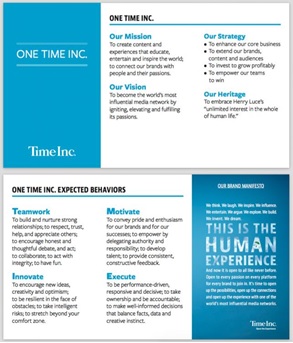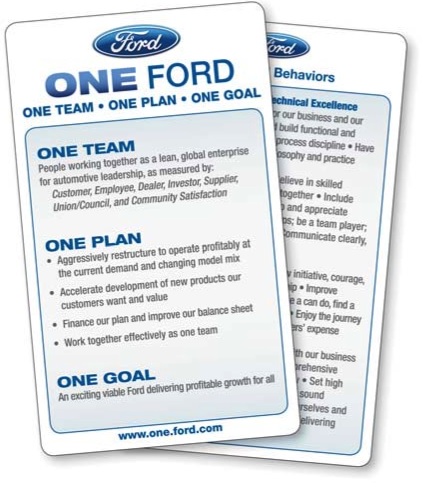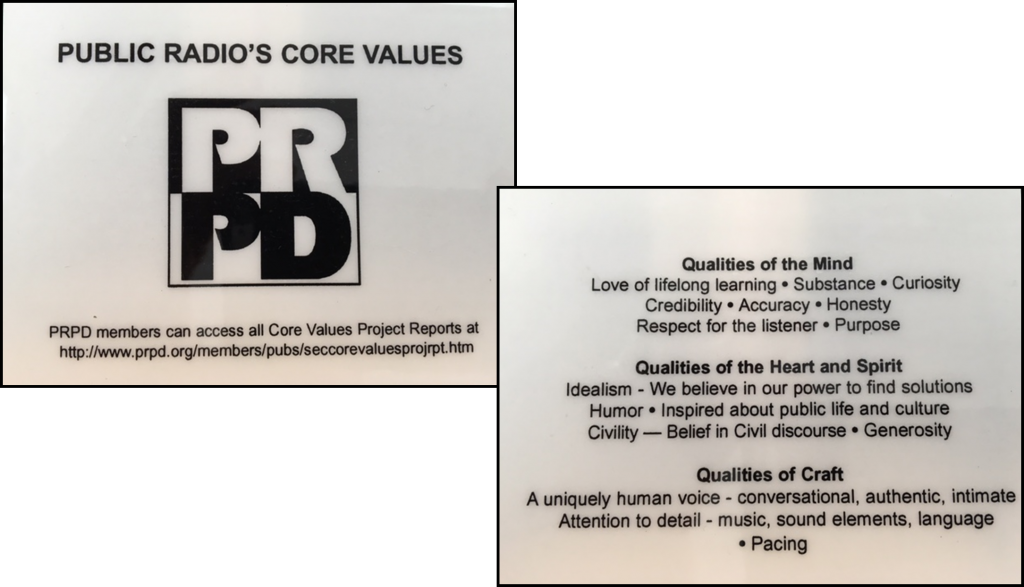When you’re up against global media and technology companies – and make no mistake about it, because for radio, that’s the competition – you’d better make sure everyone’s on the same page. Amazingly, as we travel in and out of radio stations throughout North America, it’s not hard to find staffers at all levels that aren’t exactly sure about the mission.
As we know so well, a great UX or User Experience often starts with the person answering the phones. It permeates the sales cubicles, the DJs and hosts in the air studio, as well as the C-suite. When everyone understands the core mission and what the brand is all about, everyone works a little harder and a lot smarter. In the process, the overriding goals of the organization stand a much better chance of getting accomplished.
But everyone’s moving very quickly, and there’s never the time nor patience to sit through corporate cheerleading sessions, much less read that tired “Mission Statement” that’s on the wall in the station reception area.
What’s a company to do – whether it owns 700 stations around the country or it’s just a mom and pop operation in Anytown, U.S.A.? How can it best communicate its values to its entire workforce?
Given what’s on the line today, and how close everyone is running their stations to the margins, optimizing staff performance, and making due with less, it’s essential that everyone in the operation “gets it.”
Time, Inc. recently came to that conclusion. And as a result, they created “company culture cards” – old school wallet-sized cards that make it clear what the brand stands for:
Ironically, the idea for these cards has automotive roots. When “outsider” Alan Mulally came to Detroit from the aeronautics industry, he came up with the idea for Ford Motor Company. Like radio, the car business has been in the crosshairs for years. As Mulally said early on in his Ford tenure, “We have been going out of business for 40 years.” That should resonate for everyone in radio, a business that is seemingly always on the ropes, but finds a way to keep itself very much alive and well.
Mulally participated in a training session with the Time, Inc. team. And along the way, he explained how it was essential for him to communicate the big picture to everyone at Ford operation worldwide. Hence, the card.
For Mulally, his arrival at Ford coincided with the need for strong leadership at the top. A major part of the challenge wasn’t just coming up with the framework. It was making sure the thousands of engineers, managers, executives and everyone else at Ford was preaching out of the same company hymnal. Hence his “ONE Ford” cards that everyone in the global operation received so there would be no mistaking what the company stood for.
Michele Jayne, Ford’s Project Manager for the One Ford card, laid out the result of these efforts clearly:
“This is not a chore; it is not artificial. It’s freeing! We have so much talent here at Ford, and this is the clear direction that (engages) our talent. People need clarity and feedback. How else will we know how we are doing?”
I’m thinking that every radio manager and owner shares those thoughts about their own staffs. But if the rank-and-file along with the corporate team doesn’t share the same values, opportunities are lost. How often does upper management take part in company meetings, strategy sessions, and off-sites, planning the next big thing, and yet, communicating those outcomes to the rank and file workforce is never accomplished?
There’s a radio precedent for these little mission cards that articulate what the brand or system stand for. Back around 2000, the Public Radio Program Directors organization created their own “Core Values” cards.
And you can best believe that hundreds of public radio employees still carry them around. When you’re making decisions on the fly, when you’re interfacing with clients and listeners, and when you’re under pressure to perform, a reminder about what powers the organization and what it believes in isn’t just a good idea – it’s essential.
As budgets tighten, staffs are winnowed, and the pressures never lessen, making sure your team honors their commitments, is accountable, and presents expected behaviors isn’t just important, it’s essential. That’s why something as basic as a company culture or values card is such a great idea.
Don’t leave home without it.
- What To Do If Your Radio Station Goes Through A Midlife Crisis - April 25, 2025
- A 2020 Lesson?It Could All Be Gone In A Flash - April 24, 2025
- How AI Can Give Radio Personalities More…PERSONALITY - April 23, 2025







Great article Fred, at one time some radio companies believed in mission statements and empowering its employees to represent the companies core values.
One such company was Prism Radio partners, my radio world changed once I went to work for them in Wichita. From Bill Phalen, Mike Cutchall & the corporate leadership to the local level with Tim Link & Jack Oliver, I learned how a great company got everyone involved and on board with the company mission through inclusive company meetings, strategy sessions, and off-site training/team building events.
Then consolidation happened and the new owners scoffed & laughed at such “silliness” and the properties soon went from being the envy of others in the markets to being gutted and revolving door of employees.
Keep up the great work you & the Jacobs team do, hopefully your message will someday resonate with owners in our industry.
Lester, a great company culture is to be cherished. They don’t come along every day. Appreciate the kind words and you reading our blog.
Bravos, Fred. Important stuff, thank you. Your post brings to mind a classic aphorism … Culture eats strategy for breakfast.
Good one, and so true. Thanks for the kind words and for sharing this post.
Dead on Fred!
Thanks, George. Appreciate you reading our blog.
this is great. I am starting a new job that works with the radio industry in a couple days. It was the CEO’s sincere description of why they do what they do, and how they want to do it that was the deciding factor for me. I would like to be successful and financially comfortable – but to me, the path I choose to get there is the most important. I don’t want to have to compromise my values or belief’s, I don’t want to have wealth and success unless there are a lot of other people I’ve helped, also share a part of that.
Good goals, Kaleigh, and it sounds like they are shared by your new company. Your public service attitude is a commendable one. Radio needs people who can make a difference in their local communities. Best of luck with the new job, and keep us posted with your progress.